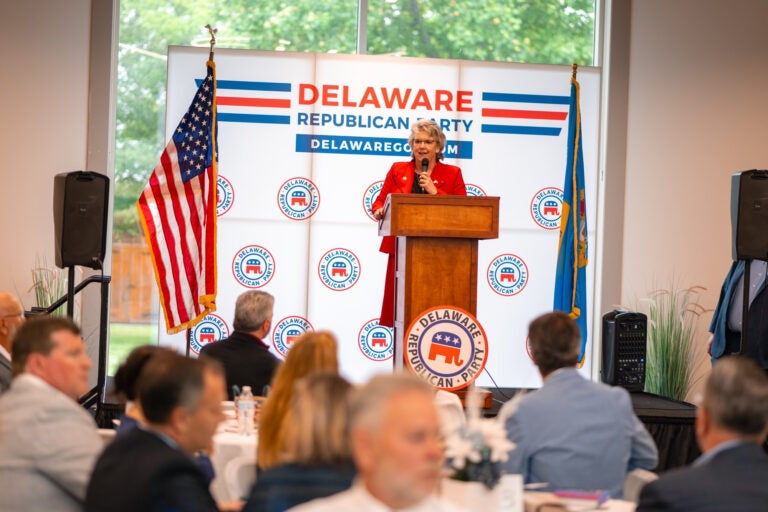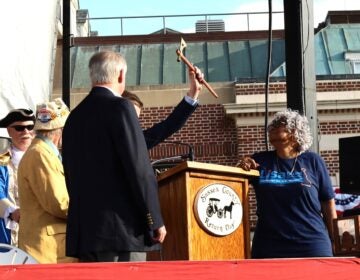Delaware Dems seem poised to retain ‘stranglehold’ on statewide offices, legislature, but some call one-party rule unhealthy
Republicans haven’t held one of the nine statewide seats since 2018, but some pin hopes on “Delaware yellow” gubernatorial candidate Mike Ramone.
Listen 2:00
Democratic leader Travis Williams is guardedly optimistic that his party can keep all nine statewide seats and control of the General Assembly. (Courtesy of Travis Williams)
What questions do you have about the 2024 elections? What major issues do you want candidates to address? Let us know.
This story was supported by a statehouse coverage grant from the Corporation for Public Broadcasting.
Dr. Mike Katz, an anesthesiologist and former Democratic state senator in Delaware, sees a patient in peril when he surveys the state’s political landscape.
Like anybody who follows Delaware politics, Katz is well aware that Democrats run the show. They hold all nine statewide elective offices, dominate both houses of the General Assembly, win races for Wilmington mayor and New Castle County executive with just token or no GOP opposition and hold a nearly 2-to-1 voter registration advantage over Republicans.
The physician also sees a sickly and weakened Republican party that hasn’t held a statewide seat since 2018 and has seen its influence on government policy and lawmaking steadily dwindle over the last three decades. He predicts the GOP will get shut out once again when voters decide the five statewide races up for grabs in the Nov. 5 general election.
“I do not believe that the Delaware GOP as a party at the state level does have the ability to break the single party stranglehold,” Katz said. “And I don’t see that it does in the future either.”
Of Delaware’s 786,577 registered voters, 45% are Democrats, 26% Republicans and 29% unaffiliated or members of minor parties.
Yet Katz doesn’t make that assessment as a true blue, diehard Democrat. He left the party in 2022 over concerns that party leaders too often discounted ideas and proposals that didn’t conform with the party mantra, and weren’t very interested in investigating or rooting out corruption among fellow Democrats.
“I don’t think that single-party control is healthy,’’ said Katz, who was a state senator from 2008 to 2012, when he lost his seat in the suburbs north of Wilmington to then-Rep. Greg Lavelle.
Now Katz is trying to shake up the status quo in Delaware by running for the U.S. Senate as a member of the Independent Party of Delaware, which he joined last year.
He’ll face four-term incumbent U.S. Rep. Lisa Blunt Rochester, a darling of the state’s Democratic party who’s vying to become Delaware’s first Black and female U.S. senator, and Republican newcomer Eric Hansen.
“I really do believe that Delaware’s in a position to lead a political revolution that prioritizes people over party, and independent candidates who are independent of party politics, of special interests and party money,” Katz said.
The anesthesiologist’s bid to knock out candidates from the two main parties appears to be a quixotic one, however, as no non-Democrat or Republican has won a statewide election, at least in recent memory. Besides, Blunt Rochester has never won by less than 12 percentage points in her four statewide races.
Samuel B. Hoff, professor emeritus of political science at Delaware State University and an observer of Delaware politics for more than three decades, says he shares concerns that one-party rule can be detrimental to democracy.
He notes that Democrats hold a 15-6 majority in the state Senate, enough to pass any bill that requires a two-thirds supermajority. Their lead in the House is 25-16, two seats short of a supermajority.
Legislators “might really say there is no hope or there is no need, or even worse there’s no ability to work across the aisle,” Hoff said. “The quality of legislation is sometimes questioned when you don’t have what I call a safety valve, the honorable opposition.”
But Hoff doesn’t see much chances of that changing at the ballot box this year, though. He said the current registration numbers and voting trends show that Democrats are the clear favorites in the five statewide races, even though four are open seats.
Besides the Blunt Rochester-Hansen-Katz race, the others are:
- U.S. Representative — Democratic state Sen. Sarah McBride vs. GOP newcomer John Whalen.
- Governor — Democratic New Castle County Executive Matt Meyer vs. Republican state Rep. Mike Ramone, the House minority leader.
- Lieutenant Governor — Democratic state Sen. Kyle Evans Gay vs. Republican former state Rep. Ruth Briggs King.
- Insurance Commissioner —Democratic incumbent Trinidad Navarro vs. GOP former Dover City Councilman candidate Ralph Taylor.
The other four statewide offices — attorney general, auditor, treasurer and Delaware’s second U.S. Senate seat — will all be up for election again in 2026.
Of all the Republicans running this year, Hoff says Ramone has the best chance to break the Democrats’ grip on statewide seats. Since 2008, Ramone has represented a Pike Creek House district where Democrats have a huge registration advantage over Republicans — currently 8,198 to 4,852.
But Ramone has won and kept his seat by appealing to the northern New Castle County district’s significant number of unaffiliated or minor party voters — currently 5,925.
Hoff said that if any Republican statewide hopeful might have crossover appeal in a state where there’s currently 353,212 Democrats, 206,770 Republicans and 226,595 other voters, it would be Ramone.
“Ramone has the best shot and I’d say it combines a number of factors,” Hoff said. “I’m not sure how aggressive they’re going to get on issues, but certainly on issues of personality and his experience, he is right there with Matt Meyer,” who didn’t run for office until 2016, when he won the first of his two terms as county executive.
Huff likened Ramone’s appeal to that of Mike Castle, a former Republican congressman, governor and lieutenant governor whose crossover support was largely due to his moderate approach to politics and governing.
Ramone, a socially moderate businessman who describes himself as “Delaware yellow” as opposed to Democratic blue or GOP red, “is the type of Republican candidate that resonates with a lot of folks,” Hoff said.
But while Ramone has won election eight times in a House district where residents know him well, it remains to be seen whether he can duplicate such success in other areas of Delaware where voters aren’t familiar with him.
Hoff also noted that GOP statewide candidates have routinely received 40% of the vote in recent elections, but rarely more.
“So the question is, what’s Mr. Ramone going to do to get that other 10%?” Hoff said.
‘You want to have different viewpoints on things’
With the election less than five weeks away, Democrats are gearing up to retain their statewide seats and retain or improve control of the legislature, while Republicans are grappling with ways to get back on the board.
GOP party chair Julianne Murray — who ran for governor in 2020 and attorney general in 2018, winning 39% and 46% of the vote, respectively — says she sees hope, especially for Ramone and Briggs King, who have held House seats.
Murray said the GOP candidates are trying to have consistent messages, focusing on issues such as poor public school academic performance and economic challenges. Murray also said the party is encouraging Republicans to take advantage of early voting, which begins Oct. 25.
That’s a change from a few years ago, when Murray’s predecessor and a GOP state senator sued to end early voting and an expansion of the state’s absentee voting rules.
“I do think that it is possible for Republicans to pick up that extra 10%” of the votes needed to surpass 50% and win, Murray said. “I think this year, in particular people who have historically always voted Democrat, won’t necessarily do that this time.”
Murray isn’t basing that assessment on polling within Delaware, but rather on anecdotal accounts from candidates and volunteers who are knocking on doors and meeting with voters, including Democrats who might have previously slammed the door on the GOP canvassers.
“People are leaning more toward the center right than they have been historically,” she said. “So yeah, we do have a shot.”
She also noted the strife in the Democratic gubernatorial primary, which Meyer won over Lt. Gov. Bethany Hall-Long, whom the party endorsed, and former state environmental chief Collin O’Mara. The campaign featured political action committee-funded attack ads against Hall-Long because of her yearlong campaign finance scandal, and against Meyer because of two unrelated sexual harassment lawsuits against a county police leader and a tax assessment supervisor since Meyer took office.
“The gubernatorial primary was very, very contentious on the Democrat side,” Murray said. “I don’t think the Bethany Hall-Long voters and the Collin O’Mara voters are automatically going to become Meyer voters.”
Beyond whether Murray’s party has any chance to win a statewide office, the GOP boss echoed Katz in saying “there is dissatisfaction with the one-party rule” in Delaware.
“If you were to ask a [state] representative or a senator, particularly a state senator, the majority is so strong that there’s just not even a conversation or a different point of view,” Murray said.
“That’s a danger. When you’re a republic, you want to have different viewpoints on things, and the one-party rule has taken over so much that it’s difficult to even get the moment at the microphone to say. ‘Hey, can we think about this from a different perspective?’”
On the Democratic side, party executive director Travis Williams seems untroubled by the perception that one-party rule could stifle dissent and ideas.
“We are elected to these positions, right?” Williams said. “It’s not like we’ve taken them. The Delaware voters have elected Delaware Democrats. They’ve chosen to vote for us and they haven’t chosen to vote for Republicans. So I think we’d be a little more worried about losing those seats if Republicans put forth some actual policies that people agree with.”
Williams also said that despite the party’s unsuccessful endorsement of Hall-Long, leaders have pivoted to supporting Meyer as well as the rest of the Democratic ticket. Outgoing Democratic Gov. John Carney also backed the lieutenant governor, recording an advertisement for her candidacy. While Hall-Long’s political career appears over, Carney will remain a prominent player in Delaware politics as mayor of Wilmington after winning the Democratic primary for that seat, with no GOP foe.
“We don’t have a lot of time to get stuck on what happened in the primary,” Williams said. “We’ve got to come together and work to elect Democrats in the general election. We’ve met and are continuing to work with all of the nominees. And now that we have them and things are going well, we’re united and working together.”
He’s also guardedly optimistic that once the results are in, Democrats will retain all nine statewide seats, and perhaps even have that House supermajority.
“We are confident in the conversations that we’ve been having with voters,” Williams said. “We’ve been getting good responses from folks as we’ve been out and talking to people about the issues. So that bodes well for us.”
“But there’s still a lot of work that has to get done right? It’s a constant conversation. There’s work that we’ve got to do so while it does look good, we’ve still got to get over the finish line.”

Get daily updates from WHYY News!
WHYY is your source for fact-based, in-depth journalism and information. As a nonprofit organization, we rely on financial support from readers like you. Please give today.












